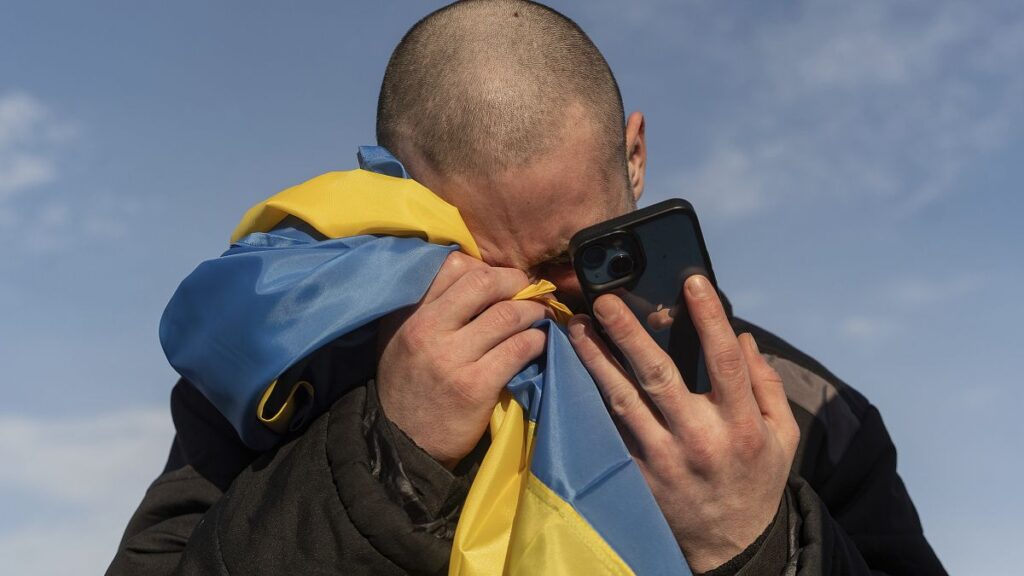According to Ukrainian Prosecutor General Andriy Kostin, nine out of ten Ukrainian prisoners of war are subjected to physical and moral torture,
Physical and moral torture, sexual violence, illegal convictions and violent executions. According to Ukrainian Prosecutor General Andriy Kostin, up to 90% of prisoners of war returning to Ukraine reported being tortured in Russian prisons, which constitutes a blatant violation of the Third Geneva Convention to which Moscow is a signatory.
Inhumane detention conditions
Serhii Rotchuk was an officer of the Ukrainian Azov Brigade, which in May 2022 defended Azovstal steel plant in Mariupol. After the assault, nearly 2,500 Ukrainian soldiers surrendered to Russia on the orders of President Volodymyr Zelenskyy.
This combat medic who spent a year in prison in Russia, where he was subjected to physical and mental torture, testifies to the very degraded state of his fellow prisoners: “Almost all of them clearly have health problems. Detained in difficult conditions, without appropriate medical support, they are constantly subjected to torture, bullying and physical or moral violence.” he testifies.
900 Azov Brigade soldiers still in captivity
Approximately 900 Azov Brigade soldiers remain in captivity in Russia. About a hundred of them were sentenced to prison terms for whatRussian prosecutors describe “participation in a terrorist organization”.
Due to alleged links to neo-Nazi and ultra-nationalist groups, this brigade was deprived of weapons and training from the West. The United States lifted the ban last June, saying a verification process had failed to find evidence of gross human rights violations.
“Who knows? If this ban had not existed for ten years, maybe the battle for Mariupol would have been different? Maybe the war map would be different today ? asks Nestor Barchuk, legal advisor to the brigade.
With Moscow giving no hope of changing its policy towards Ukrainian prisoners of war, Nestor Barchuk believes that Ukraine must fight to free the imprisoned men and women. “The only way for Ukraine to bring all of its defenders home is to win the war”he argues.
Violation of the 3rd Geneva Convention
Of the four Geneva Conventions, the third defines specific rules for the treatment of prisoners of war. It stipulates that they must be treated humanely, adequately housed and provided with sufficient food, clothing and medical care.
Still according to this text, humanitarian activities, including those of the International Red Cross (ICRC) or any other impartial humanitarian organization capable of protecting and relieving prisoners of war, must not be hindered.
While the ICRC claims to have visited nearly 3,500 prisoners of war in Ukraine and Russia, it admits that “to this day, it does not have access to all prisoners of war”.
Waiting for the return of prisoners of war
Ukrainian soldiers returning from captivity in Russia and the families of those still detained say they have no contact with prisoners of war. Without any information, they do not even know if the latter are still alive and have no other option than to wait for a prisoner exchange to take place.
Yevheniia Synelnyk hasn’t heard from her brother Artem for two years. He was one of the defenders of Mariupol. The latest information was given to him by prisoners of war who returned to Ukraine and who met Artem during his captivity. According to them, he was transferred to a prison in Taganrog, a town in Russia’s Rostov region, where detention conditions are considered appalling.
Yevheniia is a member of the Association of Families of Defenders of Azovstal, established in June 2022, a month after the siege of Azovstal. The association’s spokesperson, Marianna Khomeriki, deplores that international organizations are not doing enough.
The families’ only hope remains that the Ukrainian forces “replenish a fund” by taking prisoners among the Russian soldiers in order to be able to exchange themshe explains: “We can use this fund to save the lives and health of our soldiers captured by the Russians”.
Marianna Khomeriki, however, has no too many illusions: “Putin doesn’t want his people back.”. Since the start of the incursion in Kursk, only one exchange of prisoners of war has taken place between Chechen soldiers of Ramzan Kadyrov and those of Mariupol.
Premeditated executions
Last Thursday, Russian forces executed nine Ukrainian prisoners of war near the village of Zeleny Shlyakh in the Kursk region, according to Ukrainian investigations based on open sources.
The American think tank Institute for the Study of War analyzed a picture of the execution’s aftermath, saying that “this suggests that Russian forces disarmed, lined up, robbed and shot Ukrainian prisoners of war, and clearly indicates the premeditated nature of the executions”.
The ISW says it has recently observed an increase in executions of Ukrainian prisoners of war by Moscow’s forces, adding that Russian commanding officers tolerate, encourage or directly order these executions.
According to Serhii Rotchuk, the soldier of the Azoz brigade, the Russian army makes no secret of this. “Russian propaganda is aimed at inciting hatred towards Ukrainians. State policy is to destroy everything that is not Russian. And if someone does not want, if something does not want to be Russian, or if someone does not want to be Russian, to belong to Russia, he must die.”

